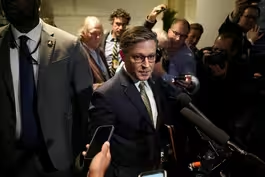
Warming planet threatens tiny deer in the Florida Keys
Clip: 12/21/2024 | 4mVideo has Closed Captions
Conservation groups try to save tiny deer in the Florida Keys from a warming planet
A type of white-tailed deer unique to the Florida Keys has been on the endangered species list for nearly 60 years. Only about 800 Key deer remain, and their habitat is under growing threat from rising sea levels. William Brangham reports for our series, “Saving Species.”
Problems playing video? | Closed Captioning Feedback
Problems playing video? | Closed Captioning Feedback
Major corporate funding for the PBS News Hour is provided by BDO, BNSF, Consumer Cellular, American Cruise Lines, and Raymond James. Funding for the PBS NewsHour Weekend is provided by...

Warming planet threatens tiny deer in the Florida Keys
Clip: 12/21/2024 | 4mVideo has Closed Captions
A type of white-tailed deer unique to the Florida Keys has been on the endangered species list for nearly 60 years. Only about 800 Key deer remain, and their habitat is under growing threat from rising sea levels. William Brangham reports for our series, “Saving Species.”
Problems playing video? | Closed Captioning Feedback
How to Watch PBS News Hour
PBS News Hour is available to stream on pbs.org and the free PBS App, available on iPhone, Apple TV, Android TV, Android smartphones, Amazon Fire TV, Amazon Fire Tablet, Roku, Samsung Smart TV, and Vizio.
Providing Support for PBS.org
Learn Moreabout PBS online sponsorshipJOHN YANG: There's a type of white tailed deer that's unique to the Florida Keys.
It's been on the endangered species list for nearly 60 years and only about 800 of them remain.
And its habitat is under growing threat from rising sea levels.
William Brangham has the latest in our series, Saving Species.
WILLIAM BRANGHAM (voice-over): These tiny deer roam freely across front yards and graze on the side of the road on some of the many islands of the lower Florida Keys.
CONNIE RITCHIE, Local Resident: They are very gentle, very gentle.
And the longer you live here, the more you want to protect them.
WILLIAM BRANGHAM (voice-over): The key deer is the smallest subspecies of the North American white tailed deer.
They're about the size of a golden retriever.
KATY HOSOKAWA, Ranger, National Key Deer Refugee: They only come to about 24 to 30 inches at shoulder height.
So they are substantially smaller, and they're only found here in the Florida Keys.
WILLIAM BRANGHAM (voice-over): The first written record of the key deer came from a 16th century Spanish shipwreck survivor.
They currently live only about two dozen of the Keys 1700 islands, swimming or wading between them and living in the mangroves, pine rocklands and freshwater wetlands.
CHRIS BERGH, The Nature Conservancy: Climate change is the thing that's going to get them, but it's those very.
WILLIAM BRANGHAM (voice-over): Habitats that are under threat from rising sea levels.
Chris Bergh is with The Nature Conservancy.
CHRIS BERGH: This is a success story.
Until now, these animals have been doing very well.
They've been coming back.
Population is not only stable, but growing.
But it's only a matter of time as the sea continues to rise, that their habitat availability is the thing that undoes the key deer.
WILLIAM BRANGHAM (voice-over): The key deer was in danger of disappearing in the 20th century when their population dwindled down to just an estimated 25 animals.
The construction of Highway 1 in the 1920s cut their habitat in two.
Booming residential and commercial development didn't help matters, and overhunting and poachers from Cuba were a further threat.
But that changed with the creation of a national refuge for them in 1957.
But now a warming planet threatens that progress.
The sparkling waters that surround the Florida Keys may be a major tourist draw.
But the national oceanic and Atmospheric Administration estimates that in 75 years-time, sea levels around parts of the Keys could rise anywhere from one and a half to seven feet.
And rising sea temperatures will increase the severity of storms and hurricanes, both of which damage the deer's habitat.
CHRIS BERGH: We're not getting our arms around the climate change challenges nearly fast enough.
I expect by 2050 to be standing in a foot of water and then by the middle of the, by 2100 to be waist deep in seawater here.
At that point, there won't be viable key deer populations here in the Florida Keys.
But I think they will probably be rescued, so to speak, by bringing them into zoos.
But I think that's a very sad outcome for a very interesting iconic Florida key species.
WILLIAM BRANGHAM: Even with rising seas all around, for locals like Jan Svejkovsky and his group Save Our Key Deer, it's still a species worth saving.
JAN SVEJKOVSKY, Save Our Key Deer: You know, some estimates are that the Earth is losing thousands of species a year.
So is one little deer that's already very limited in its habitat range going to really make a difference?
Biologically, probably not.
But physically and personally living, you know, living among them, I think, yeah, it makes a difference.
I think we should try to preserve them.
WILLIAM BRANGHAM (voice-over): For PBS News Weekend, I'm William Brangham.
Major takeaways from the chaotic funding deal in Congress
Video has Closed Captions
Clip: 12/21/2024 | 4m 52s | Major takeaways from this week’s chaotic, last-minute funding deal in Congress (4m 52s)
Middle East crisis leave millions of children in dire need
Video has Closed Captions
Clip: 12/21/2024 | 7m 3s | Ravages of war in Gaza, Lebanon and Syria leave millions of children in dire need (7m 3s)
What to know about a surge of walking pneumonia in children
Video has Closed Captions
Clip: 12/21/2024 | 5m 38s | What to know about a surge of walking pneumonia cases among young children (5m 38s)
Providing Support for PBS.org
Learn Moreabout PBS online sponsorship
- News and Public Affairs

FRONTLINE is investigative journalism that questions, explains and changes our world.

- News and Public Affairs

Amanpour and Company features conversations with leaders and decision makers.












Support for PBS provided by:
Major corporate funding for the PBS News Hour is provided by BDO, BNSF, Consumer Cellular, American Cruise Lines, and Raymond James. Funding for the PBS NewsHour Weekend is provided by...


